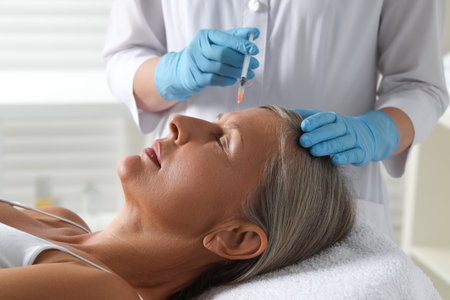1. Understanding Skin Ageing in the UK Context
Skin ageing is a natural, biological process influenced by both our genetics and the environment we live in. In the UK, this journey towards mature skin unfolds uniquely, shaped by local weather patterns and daily routines. While many imagine sun-drenched climates as the primary culprit of premature skin ageing, it’s important to recognise that even under our famously overcast British skies, ultraviolet (UV) rays can deeply impact skin health. The cool, often damp climate might offer a sense of protection, but UVA rays penetrate clouds year-round, subtly accelerating the breakdown of collagen and elastin fibres. Alongside this, lifestyle choices—such as frequenting outdoor events regardless of the season or taking brisk walks in parks during lunch breaks—expose us to environmental factors that hasten visible signs of ageing like fine lines, dullness, and uneven tone. Understanding how these elements interact with our skin’s biology empowers us to make mindful decisions, protecting our complexion while embracing life in the UK with confidence.
2. The Impact of Sun Exposure on British Skin
It’s easy to underestimate the power of the sun in the UK, especially given our famously unpredictable and often cloudy weather. However, scientific research reveals that ultraviolet (UV) radiation penetrates cloud cover with surprising effectiveness, meaning that even on overcast days, your skin is still exposed to damaging rays. This persistent exposure can quietly accelerate signs of ageing among Britons, regardless of how mild or brief the sunlight may seem.
How UV Radiation Penetrates British Weather
Contrary to popular belief, up to 80% of UV rays can pass through clouds, making protection a year-round necessity. In fact, UVA rays—responsible for deep skin ageing—are present with relatively equal intensity during daylight hours throughout the year. Whether you’re walking along Brighton Beach in July or commuting in Manchester on a dull January morning, your skin is vulnerable.
Types of UV Rays and Their Effects
| Type of UV Ray | Penetration Ability | Primary Effect on Skin |
|---|---|---|
| UVA | Deep into dermis (even through glass and clouds) | Premature ageing: wrinkles, loss of elasticity |
| UVB | Mainly affects surface epidermis | Burns, DNA damage, pigmentation changes |
The Unique Challenge for British Skin Types
The majority of people living in the UK have Fitzpatrick skin types I-III—fair to light olive tones—which are particularly sensitive to UV damage. This means that even low-intensity sun exposure can result in cumulative harm over time, manifesting as fine lines, pigmentation spots, and a general loss of youthful plumpness. What makes this even trickier is that signs of sun damage often appear decades after initial exposure.
Cumulative Sun Damage: A Silent Ageing Factor
While we might associate sunburn with holidays abroad or rare heatwaves at home, everyday activities such as popping out for lunch or gardening contribute incrementally to skin ageing. In essence, it’s not just those rare sunny days you need to be wary of—it’s the daily drizzle-laced strolls and grey afternoons too.
Nurturing Confidence Through Awareness
Understanding how sun exposure truly impacts British skin empowers you to make gentle yet effective changes in your daily routine. Protecting your skin isn’t about restriction—it’s about nurturing your natural beauty for years to come. Embrace this knowledge as a foundation for self-care and confidence; after all, taking small steps today ensures a brighter, healthier tomorrow for your complexion.
![]()
3. Visible Signs of Sun-Induced Ageing
When it comes to understanding how sun exposure accelerates the ageing process, it is essential to recognise the early indicators that often emerge on the skin—especially in the UK, where many people underestimate UV risks due to our frequently overcast skies. While we may not experience Mediterranean sunshine daily, UVA rays are ever-present and can penetrate cloud cover, gradually impacting our skin health.
Common Early Symptoms Among Britons
Photoageing typically manifests subtly at first, but these changes can become increasingly pronounced without adequate protection. For many people across the UK, some of the earliest signs include uneven pigmentation—commonly referred to as age spots or sun spots—which tend to appear on areas most exposed to sunlight, such as the face, hands, and décolletage.
Fine Lines and Wrinkles
The development of fine lines is another hallmark of sun-induced ageing. These delicate creases often form around the eyes (crow’s feet), mouth, and forehead. Over time, with repeated UV exposure, these lines can deepen into more noticeable wrinkles, contributing to an overall older appearance than your years might suggest.
Loss of Skin Elasticity and Texture Changes
Another significant symptom is a decline in skin elasticity. The skin may begin to feel less firm or resilient—a result of collagen and elastin breakdown triggered by UV radiation. This can also lead to a rougher texture or enlarged pores, making the skin appear tired or lacklustre.
Why Early Detection Matters
Identifying these early signs of photoageing empowers you to act promptly and mitigate further damage. In the UK, where attitudes towards sun protection are evolving but still sometimes lax, being vigilant about these subtle changes is a powerful step towards maintaining youthful, healthy skin for longer.
4. Protecting Your Skin: Sun Care Habits for All Seasons
In the UK, it’s all too easy to believe that sun protection is only necessary during the rare summer scorcher or a beach holiday abroad. However, the science of skin ageing makes it clear: ultraviolet (UV) radiation is present every day, even when clouds blanket the sky or temperatures feel cool. Let’s gently debunk the myth that sunscreen is only for hot, sunny days and explore practical, culturally relevant habits for year-round protection.
Understanding UV in the British Climate
While the UK may not boast endless sunshine, UVA rays—responsible for premature ageing—penetrate cloud cover and glass. Even on overcast days, these rays reach our skin as we go about daily routines, whether walking to work, gardening, or popping out for errands. It’s crucial to remember that cumulative exposure adds up over time and contributes significantly to lines, pigmentation, and loss of skin elasticity.
Essential Sun Care Strategies for Every Season
| Season | Typical Weather | Recommended Protection |
|---|---|---|
| Spring & Summer | Variable; occasional heatwaves, longer daylight hours | Apply broad-spectrum SPF 30+ daily; reapply if outdoors for extended periods. Wear sunglasses and a wide-brimmed hat during midday sun. |
| Autumn & Winter | Shorter days; frequent cloud cover and rain | Continue using SPF daily—UVA penetrates clouds. Opt for moisturisers with built-in SPF for ease and comfort in colder months. |
| Year-round (indoors) | Exposure through windows at home/work | If sitting near windows, particularly south-facing ones, maintain sunscreen use to protect from incidental UV exposure. |
Culturally Relevant Tips for UK Lifestyles
- Sunscreen as a Habit: Keep your favourite SPF next to your toothbrush—making it part of your morning routine ensures you won’t forget.
- Layer Up Wisely: Lightweight scarves and long sleeves add extra protection on cooler days without sacrificing style.
- The Commute Counts: Whether you walk or drive, remember that UVA can penetrate car windows. A quick SPF application before heading out offers invisible armour against ageing rays.
- Community Events: Outdoor festivals, garden parties, and sporting events are popular across the UK—always pack a travel-sized sunscreen and share with friends and family.
- Mental Reframe: Think of sunscreen as an essential like brushing your teeth—not just a ‘holiday item’ but a daily act of self-care that pays off beautifully in years to come.
Your Confidence-Boosting Takeaway
No matter how grey or chilly it feels outside, protecting your skin from the invisible threat of UV is an empowering choice. By embracing these straightforward habits tailored to British weather and lifestyles, you’re nurturing not just your complexion but your confidence—knowing you’re actively investing in healthier, more youthful-looking skin all year round.
5. Reversing and Minimising Sun Damage: Science-Backed Solutions
While prevention is always preferable, its reassuring to know that the effects of sun damage on the skin are not wholly irreversible. In the UK, a wealth of science-backed solutions—ranging from dermatological treatments to everyday skincare and lifestyle tweaks—empower you to reclaim your skins radiance and resilience.
British Dermatological Treatments
Consulting a qualified dermatologist remains the gold standard for addressing pronounced sun damage. British clinics commonly offer advanced procedures such as chemical peels, which gently exfoliate damaged layers and promote cell turnover; laser therapy, which targets pigmentation and boosts collagen production; and micro-needling, renowned for its ability to smooth fine lines and improve overall texture. These treatments are tailored to your unique skin type and concerns, ensuring effective results under expert care.
Over-the-Counter Products with Proven Efficacy
The high street in the UK offers a robust selection of over-the-counter products designed to combat visible signs of photodamage. Look for serums and creams rich in antioxidants like Vitamin C, which help neutralise free radicals and brighten dull complexions. Retinoids, available in various strengths, are celebrated for their capacity to stimulate collagen synthesis and diminish pigmentation. Additionally, broad-spectrum SPF moisturisers remain essential—not only for protection but also to prevent further harm while your skin heals.
Lifestyle Adaptations for Lasting Results
Daily habits play a crucial role in reversing and preventing sun-induced ageing. Prioritise wearing wide-brimmed hats and UV-blocking sunglasses when outdoors—a must even on cloudy British days. Embrace a diet abundant in fruits, vegetables, and healthy fats, as these nourish your skin from within. Lastly, make it a ritual to apply sunscreen every morning, regardless of the season; consistency is key to sustaining the progress achieved through professional or at-home interventions.
By integrating these science-backed strategies into your routine with gentle persistence and self-assurance, you can effectively counteract sun damage and inspire lasting confidence in your natural beauty.
6. Embracing Confident, Healthy Ageing in the UK
Ageing is a natural and beautiful part of life, and in the UK’s vibrant communities, celebrating every stage is essential. Developing a positive mindset around ageing begins with recognising that healthy skin is achievable at any age, regardless of background or lifestyle. While sun damage can accelerate signs of premature ageing, it’s never too late to adopt accessible routines that help your skin remain radiant and resilient.
Cultivating Confidence Through Self-Care
Confidence starts with self-care. In the UK, where weather conditions can vary from brisk Scottish winds to gentle Cornish sunlight, finding a daily skincare routine that works for you is key. Prioritise gentle cleansing, regular moisturising, and broad-spectrum SPF—even on cloudy days. These simple steps are affordable and easily incorporated into even the busiest British lifestyles.
Celebrating Diversity in British Beauty
Britain’s rich diversity means that skin comes in many shades and types. Each deserves tailored care and recognition. Whether you have fair skin that freckles or deeper tones that require extra hydration, embrace products and practices that meet your unique needs. Community pharmacies across the UK offer expert advice and inclusive product ranges so everyone can feel represented and supported on their skincare journey.
The Power of Positivity
Your attitude towards ageing can transform your experience. Focus on what your skin has achieved—how it protects you from the elements and expresses your personality through every smile line. Surround yourself with positive influences: local support groups, online forums, or friends who celebrate each other’s stories. Remember, healthy ageing isn’t about erasing the past but honouring it while nurturing your future self.
By adopting science-backed strategies and embracing your individuality, you can confidently enjoy every chapter of life in the UK. Let’s champion radiant skin not as a symbol of youth but as a testament to resilience, self-love, and the wonderful diversity of British beauty.


